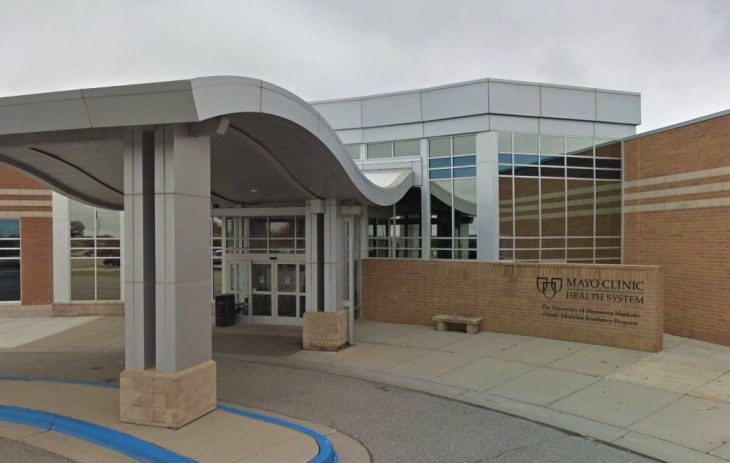About Mayo Clinic Health System Eastridge Clinic
Based in Mankato, Minnesota, the Health System Eastridge Clinic is one of many family clinics, hospitals and healthcare facilities run by The Mayo Health Clinic across Minnesota, Wisconsin and Iowa. Care is available to clients of all ages, genders and backgrounds. The clinic accepts Medicare, as well as other commercial insurance options. They also offer financial assistance to those eligible.
Mankato’s Health System Eastridge Clinic offers treatment for substance abuse and dual-diagnosis conditions. Care begins with clients receiving a thorough assessment, conducted by a case management team of highly trained psychologists and clinical therapists. From here, clients will work with the team to create an individualized treatment plan.
The addiction treatment programs offered here draw from elements of motivational enhancement and cognitive behavioral therapy (CBT) while teaching relapse prevention and integrating 12-step recovery principles as part of therapy. Programs specifically offered at this location include a men’s residential addiction and mental health program, a residential extended care program, outpatient services and teen chemical health services.
The extended care program is recommended for adults regularly relapsing, or experiencing chronic substance abuse issues. The core focus of this program is relapse prevention with individual, group and family counseling included alongside daily meditation, relaxation skills training and recreational therapeutic activities. This is offered over a 90-day period while the men’s program is 30 days long.
Outpatient services also include programming designed specifically for teens, as well as transitional services and relapse tracking to support individuals as they adjust back into their daily routine post-recovery. Meanwhile, the clinic’s chemical health classes are offered to teens aged 13 to 17 to promote addiction education and prevention in young people.
Levels of Care
-
Inpatient
Inpatient and residential programs provide round-the-clock medical and emotional support as you live at the treatment facility. This level of care may be recommended if you have severe addictions or mental health conditions since it removes outside distractions and allows you to focus solely on therapy.
-
Outpatient
In outpatient therapy, you’ll attend therapy sessions several times each week while living at home. This is ideal if you have a strong support system and a lower risk of relapse. Outpatient treatment offers flexibility to maintain work, school or family obligations.
-
Aftercare
Aftercare programs provide ongoing support after you complete a rehab program. They may include several components to help you maintain sobriety including therapy, community support groups and relapse prevention strategies. This gives you a network of resources as you reintegrate into your daily life.
-
Dual Diagnosis
Dual diagnosis programs address substance use disorders and co-occurring mental health conditions simultaneously. This integrated approach to care improves the likelihood of long term recovery and stability by addressing the root causes of addiction.
Detox Service Setting
-
Inpatient Detox
Inpatient detox occurs in a dedicated treatment facility. You’ll live there around the clock and receive intensive medical support and supervision to help manage your withdrawal symptoms. It is suitable for individuals with moderate to severe addictions as it ensures a stable detox environment.
-
Outpatient Detox
Outpatient detox gives you access to medically supervised withdrawal services while still allowing you to live at home. You’ll attend a clinic for treatment and monitoring. This flexible option is suitable for those with mild to moderate withdrawal symptoms who have strong support systems.
Programs
-
Adult (18+)
Adult programs address the substance use and life challenges specific to adults. Therapists can deliver sessions in individual, group and family settings. Services often include job support and life skills training in a structured environment.
-
Alcohol Detox
Alcohol detox programs offer medical support to help individuals withdraw safely from alcohol. Your care team may use medications to ease your symptoms and provide medical monitoring to address complications.
-
Cognitive Behavioral Therapy
Cognitive behavioral therapy focuses on changing harmful thought patterns and behaviors associated with addiction. You’ll learn healthier coping mechanisms by identifying and replacing negative thoughts. This improves your emotional resilience and decreases your relapse potential.
-
EMDR Therapy
EMDR stands for eye movement desensitization and reprocessing therapy. It helps you process traumatic memories that may underlie addiction. You’ll learn how to reduce emotional distress and begin healing from past events. This makes it effective for trauma related addiction causes.
-
Men
Men's programs address substance use while also considering the social pressures, family roles and mental health concerns that are specific to men. You’ll learn healthy coping mechanisms as you build emotional resilience and develop communication skills.
-
Opioid Detox
Opioid detox uses medications to ease severe withdrawal symptoms. It also includes medical supervision to help you manage potential complications. These services allow you to stabilize and begin a recovery plan.
-
Women
Women's programs offer a safe and supportive space to focus on gender specific issues such as trauma, family roles and mental health conditions. Therapists tailor the sessions to address women's needs and foster empowerment in a healing and nurturing environment.
-
Young Adult (18 - 25)
Young adult programs are designed for individuals who are transitioning into adulthood. Topics of discussion typically include identity, independence and peer relationships. Providers may also offer life skills training and career support.
Payment Options
- Medicaid
- Medicare
- Private Insurance
- Self Pay
Accreditations
-
 Joint Commission
Joint Commission
Contact
101 Martin Luther King Junior Drive
Mankato, MN 56001





